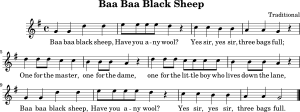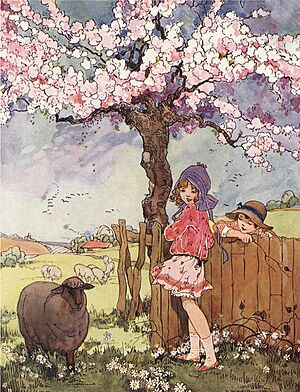Baa, Baa, Black Sheep facts for kids
Quick facts for kids "Baa, Baa, Black Sheep" |
|
|---|---|

Sheet music
|
|
| Nursery rhyme | |
| Published | c. 1744 |
| Songwriter(s) | Unknown |
"Baa, Baa, Black Sheep" is a famous English nursery rhyme. It's a very old song, with the first printed version appearing around 1744. That's over 250 years ago! The words of the rhyme haven't changed much since then. It is sung to a tune that also sounds like other well-known songs.
The Rhyme Today
Most people know the rhyme like this:
Baa, baa, black sheep,
Have you any wool?
Yes, sir, yes, sir,
Three bags full;
One for the master,
And one for the dame,
And one for the little boy
Who lives down the lane.
This rhyme has a simple, bouncy rhythm that makes it easy for young children to learn and sing. It's a very popular song and has been sung in many different places, like Great Britain and North America.
The Tune We Know
The tune for "Baa, Baa, Black Sheep" is very famous! It comes from an old French melody from 1761 called Ah! vous dirai-je, maman. You might recognize this tune because it's also used for other popular children's songs, like "Twinkle, Twinkle, Little Star" and the "Alphabet song".
The words and the melody for "Baa, Baa, Black Sheep" were first printed together in a book in Philadelphia in 1879.
In Sweden, the rhyme was translated into Swedish in 1872. A special tune was written for it, and the black sheep became a white lamb! This Swedish version, Bä, bä, vita lamm, is one of the most loved children's songs in Sweden.
Baa, Baa, Black Sheep in Pop Culture
Because it's such a well-known rhyme, "Baa, Baa, Black Sheep" has appeared in many books and TV shows.
- The famous writer Rudyard Kipling wrote a story in 1888 called "Baa Baa, Black Sheep." It was based on some of his own childhood experiences.
- During World War II, a group of brave pilots in the United States Marine Corps were called the "Black Sheep Squadron." Their leader, Colonel Pappy Boyington, wrote a book about their adventures, which was also turned into a TV series called Baa Baa Black Sheep (later known as Black Sheep Squadron). This show aired from 1976 to 1978.
- In 1951, "Baa, Baa, Black Sheep" made history! It was one of the very first songs ever to be saved and played using a computer.
Images for kids
-
Illustration for the rhyme from Mother Goose's Melody, first published around 1765



